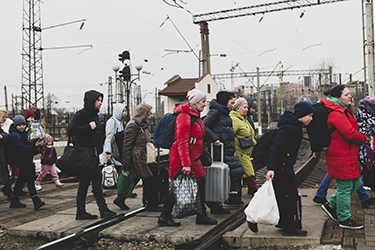APHA members should speak up and call for accountability for violence against health care workers in Ukraine, said Leonard Rubenstein, a lawyer and professor of the practice at Johns Hopkins Bloomberg School of Public Health.
Public health workers “need to show the people in Ukraine who are on the front lines showing enormous courage…that we have their backs. That makes a difference,” he said during the APHA 2022 session “The War in Ukraine: Public Health Perspectives.”
Rubenstein founded and chairs the Safeguarding Health in Conflict coalition, which works to protect health care workers, services and infrastructure. The coalition’s data show that from 2016 to 2021 worldwide there were 4,094 reported incidents against health care workers in war zones and 978 hospitals damaged or destroyed. One health care worker is killed every three days in conflict areas, he said.
 Rubenstein pointed out that when the Geneva Conventions — which establish international humanitarian law — were adopted in 1864, their primary purpose was the protection of health care. Since then, the health care protections have expanded, recognizing that those attacking health care during conflicts are committing war crimes.
Rubenstein pointed out that when the Geneva Conventions — which establish international humanitarian law — were adopted in 1864, their primary purpose was the protection of health care. Since then, the health care protections have expanded, recognizing that those attacking health care during conflicts are committing war crimes.
However, Rubenstein said, for more than 100 years, there has been little attention or accountability from the international community for these attacks. Historically, there has been “utter impunity” for attacks on health services and people during wars.
But that could soon change. Several organizations are tracking data and collecting evidence of attacks on health care in Ukraine. From February to November 2022, there have been 645 attacks by Russia on health services in Ukraine, according to the World Health Organization. That number is similar to the number of Russian attacks identified in Syria — but that was over 10 years, not nine months, Rubenstein said.
Although WHO now tracks attacks on health care, there is very little information collected beyond raw numbers, making the information “useless,” he said.
“It’s very difficult to use this information for accountability, but other organizations have really stepped up to document what’s going on.”
The data collection arm of Safeguarding Health in Conflict, called Insecurity Insight, shows that most attacks in Ukraine are in the east. The Ukraine Ministry of Health has said that every hospital in the east has been hit at least once. Data show that attacks were most intense at the beginning of the war in early 2022, but they’ve been a constant throughout the year. Most were indiscriminate, using weapons that cannot distinguish between targets, which is also a violation of the Geneva Conventions, Rubenstein said.
Another organization that has become involved is Ukrainian Healthcare Center, which is investigating all health care attacks it can access, taking photos and collecting evidence on the ground. The center was primarily a policy think tank before the war until it refocused on documenting attacks on health care, Rubenstein said.
In addition, the Humanitarian Research Lab at Yale School of Public Health has used satellite data to assess health care attacks. Rubenstein said a United Nations commission of inquiry is also “deeply, deeply involved” in investigating health care attacks in Ukraine.
“This is the basis for accountability that we’ve never had,” Rubenstein said. “Ukraine provides an opportunity for accountability which has been missing. And we need accountability if we’re ever going to say, ‘Perpetrators, there are going to be consequences if you do this. If we capture you, we’re going to send you to prison for these war crimes.’”
There is an effort now to persuade other countries to prosecute under “universal jurisdiction,” which means a war crime can be processed anywhere, without any relation to the conflict.
Germany has been working to prosecute war criminals for crimes in Syria, even though Germany was not involved in that conflict.
Ukraine and its supporters are also pushing for a new tribunal for prosecuting the origins of the war and Russia’s illegitimate aggression.
“This may be, we hope, not a turning point for accountability for perpetrators of crimes (only) in Ukraine but for perpetrators of crimes in health care around the world,” Rubenstein said.
He added, “we have an opportunity, finally, to say that people will pay a price for these crimes.”
Photo: People in Lviv, Ukraine, carry belongings across train tracks just days after the Russian invasion began in early 2022. Photo by Joel Carillet, iStockphoto.